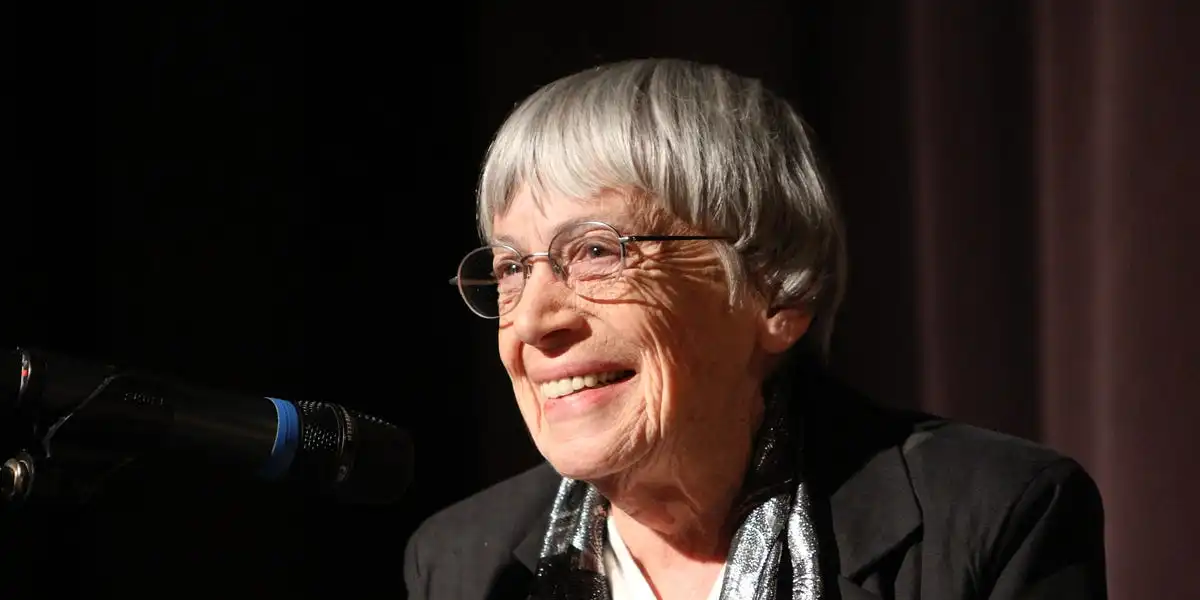ChatGPT cannot imagine freedom or alternatives; it can only present you with plagiarized mash-ups of the data it’s been trained on. So, if generative AI tools begin to form the foundation of creative works and even more of the other writing and visualizing we do, it will further narrow the possibilities on offer to us. Just as previous waves of digital tech were used to deskill workers and defang smaller competitors, the adoption of even more AI tools has the side effect of further disempowering workers and giving management even further control over our cultural stories.
As Le Guin continued her speech, she touched on this very point. “The profit motive is often in conflict with the aims of art,” she explained. “We live in capitalism, its power seems inescapable — but then, so did the divine right of kings. Any human power can be resisted and changed by human beings. Resistance and change often begin in art. Very often in our art, the art of words.” That’s exactly why billionaires in the tech industry and beyond are so interested in further curtailing how our words can be used to help fuel that resistance, which would inevitably place them in the line of fire.
[…]
The stories and artworks that resonate with us are inspired by the life experiences of artists who made them. A computer can never capture a similar essence. Le Guin asserted that to face the challenging times ahead, we’ll need “writers who can remember freedom — poets, visionaries — realists of a larger reality.” Generative AI seems part of a wider plan by the most powerful people in the world to head that off, and to trap us in a world hurtling toward oblivion as long as they can hold onto their influence for a little longer.
As Le Guin said, creating art and producing commodities are two distinct acts. For companies, generative AI is a great way to produce even more cheap commodities to keep the cycle of capitalism going. It’s great for them, but horrible for us. It’s our responsibility to challenge the technology and the business model behind it, and to ensure we can still imagine a better tomorrow.



If you want to create really good art that is as close as it can be to the truth or your heart, you cannot be too caught up in having to earn enough for food and shelter. That is what gets more difficult for more people in a hyper capitalist society.
It’s not so much that tech is used to create art. I don’t mind CGI, AI-generated stuff, drum computers … all can be used to create great art.
But very little great art is created these days. Every movie seems the Xth derivative of some superhero shit. Almost like a super-in-your-face-hero-narrative pushed to the extreme. There is a distinct lack of new narratives in mainstream, it all seems so dystopianly tired and worn-out.
Or is the better content just hard to find between all the junk that’s out there? I don’t think the tech is directly responsible, but the artist being forced into thinking of himself as the creator of a product that has to satisfy n people, or alternatively having to be the creator of a product of his liking that might never be completed as the artist has to work to finance his passion.
What the use of complex tech can to some people: it discourages them from creating earnest art with simpler means, because they believe it can’t complete with the ‘real’ or the ‘big’ stuff. These days I kind of force myself to draw with pencils and play acoustic instruments just to get back to something really simple and screen-less, and it has been a delight, but I’ve also gotten stuck in some ‘got-to-buy-more-to-get-better’ kind of loop in art and hobbies. Some feel the pressure to ‘generate enough content’ so as to not be drowned out by faster creators, but that turns art into a race and is rather silly.
A passionate and well cared for artist can create great art using a stick and/or AI, anyways, and the art just happens to take the time it needs to be created. We could do with a little less capitalism to take the pressure of the artist.